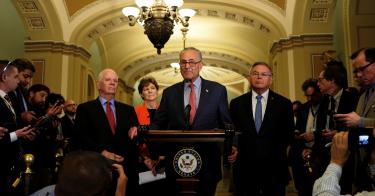The confirmation hearing for Supreme Court nominee Thurgood Marshall, then a judge on the U.S. Court of Appeals, began on July 13, 1967. Marshall was asked for his views on legal issues that could come before the Supreme Court, views he had discussed when he previously served as solicitor general. Marshall declined, noting the common practice of a Supreme Court nominee to “deem it inappropriate to comment on matters which will come before him as a Justice.”
Coming to Marshall’s defense was Senator Ted Kennedy (D., Mass.) then a junior member of the committee. Kennedy interjected that “you have, as a nominee, a different responsibility, as I understand it, as to commenting on questions that might come up before the Court . . . then you have had as the solicitor general.” Later, Kennedy said that senators “have to respect that any nominee to the Supreme Court would have to defer any comments on any matters which are before the Court or very likely to appear before the Court.”
Kennedy voted for Marshall, who had been nominated by a fellow Democrat, Lyndon Johnson.
Skip to 1993. Kennedy was still on the Judiciary Committee when another judge on the U.S. Court of Appeals, Ruth Bader Ginsburg, was nominated to the Supreme Court. Ginsburg was even more direct than Marshall had been, saying that she would provide, “no hints, no forecasts, no previews” about how she would address issues on the Supreme Court. To do so, she said, would “show disdain for the entire judicial process.”
Kennedy voted for Ginsburg, who had been nominated by another fellow Democrat, Bill Clinton.
Now jump to 2005, when another judge on the U.S. Court of Appeals, John Roberts, was nominated to the Supreme Court. This time, Kennedy wanted to know the very thing that he said Marshall had a responsibility not to provide. He wanted Roberts’s legal views on issues . . . and even more. As he told an AFL-CIO rally, “we need to know whose side Mr. Roberts is on.” Will he take the side of workers and “average Americans,” Kennedy asked, or the side of HMOs and “polluters.”
Kennedy voted against Roberts, a Republican nominee. So did Senator Chuck Schumer (D., N.Y.).
Today, with Schumer as Senate minority leader, another judge on the U.S. Court of Appeals, Brett Kavanaugh, has been nominated to the Supreme Court. Within hours of Kavanaugh’s nomination, Schumer took to the Senate floor and said he would demand “affirmative commitments” to vote a certain way on particular issues.
Oh, what a difference a political party makes.
This piece originally appeared in National Review



